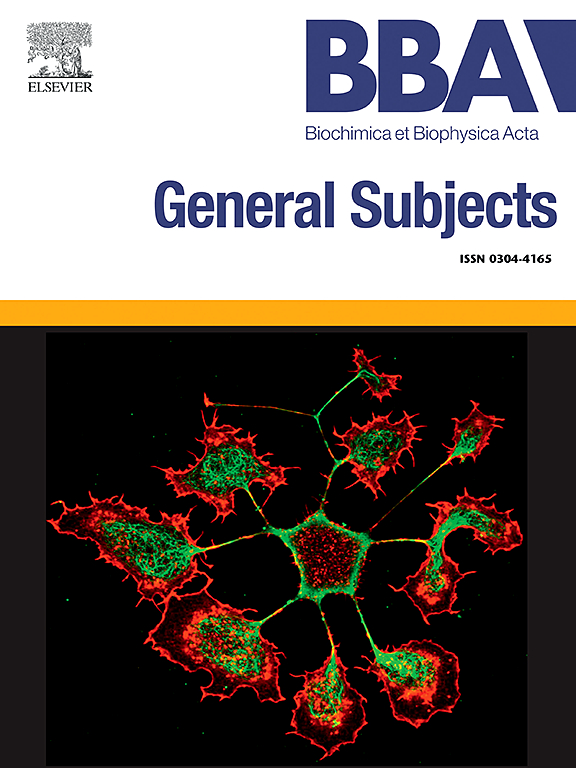Fucosyltransferase 4 upregulates P-gp expression for chemoresistance via NF-κB signaling pathway
IF 2.2
3区 生物学
Q3 BIOCHEMISTRY & MOLECULAR BIOLOGY
Biochimica et biophysica acta. General subjects
Pub Date : 2025-02-01
DOI:10.1016/j.bbagen.2024.130753
引用次数: 0
Abstract
Background
Multidrug resistance (MDR) poses a significant obstacle to developing chemotherapeutic treatments. In previous studies using a traditional model of adriamycin resistance (ADR) with K562 cells, we demonstrated that N-acetylglucosaminyltransferase III (GnT-III) expression negatively regulates chemoresistance. Additionally, we observed that fucosylation levels were increased in the ADR cells.
Method
Fucosylation levels were determined using lectin blot, western blot, and flow cytometry. Gene expression levels were analyzed via qPCR. We generated a FUT4 knockout (KO) ADR cell line using CRISPR/Cas9 technology. Cytotoxicity and drug efflux assays were conducted to evaluate chemotherapy tolerance.
Results
The expression levels of FUT4 and its products, the LeX antigens, were significantly upregulated in the ADR cells compared to the parental K562 cells. The FUT4 KO reduced the elevated levels of P-glycoprotein (P-gp) found in ADR cells and exhibited increased sensitivity to chemotherapeutic drugs. Furthermore, restoring FUT4 expression in the KO cells effectively reversed P-gp expression, drug efflux, and chemoresistance. Given the critical role of the NF-κB pathway in P-gp expression, we investigated NF-κB signaling and found that the phosphorylation levels of p65 were significantly increased in the ADR cells but were downregulated in the FUT4 KO cells. Furthermore, the restoration of FUT4 rescued the phosphorylation levels of p65.
Conclusions
FUT4 specifically upregulates P-gp expression related to chemoresistance through the NF-κB signaling pathway.
General significance
This study highlights the importance of FUT4 in chemoresistance and suggests it may serve as a promising target for combating MDR.
focusyltransferase 4通过NF-κB信号通路上调P-gp的表达,参与化学耐药。
背景:多药耐药(MDR)是化疗发展的重要障碍。在之前的研究中,我们使用传统的K562细胞阿霉素耐药(ADR)模型,证明n -乙酰氨基葡萄糖转移酶III (GnT-III)的表达负调控化疗耐药。此外,我们观察到ADR细胞的聚焦化水平升高。方法:采用凝集素blot、western blot和流式细胞术检测聚焦化水平。通过qPCR分析基因表达水平。我们使用CRISPR/Cas9技术产生了FUT4敲除(KO) ADR细胞系。采用细胞毒性和药物外排试验评价化疗耐受。结果:与亲本K562细胞相比,ADR细胞中FUT4及其产物LeX抗原的表达水平显著上调。FUT4 KO降低了ADR细胞中p -糖蛋白(P-gp)的升高水平,并表现出对化疗药物的敏感性增加。此外,恢复FUT4在KO细胞中的表达可有效逆转P-gp的表达、药物外排和化疗耐药。考虑到NF-κB通路在P-gp表达中的关键作用,我们研究了NF-κB信号传导,发现p65的磷酸化水平在ADR细胞中显著升高,而在FUT4 KO细胞中下调。此外,FUT4的恢复恢复了p65的磷酸化水平。结论:FUT4通过NF-κB信号通路特异性上调与化疗耐药相关的P-gp表达。一般意义:这项研究强调了FUT4在化疗耐药中的重要性,并表明它可能作为对抗MDR的有希望的靶点。
本文章由计算机程序翻译,如有差异,请以英文原文为准。
求助全文
约1分钟内获得全文
求助全文
来源期刊

Biochimica et biophysica acta. General subjects
生物-生化与分子生物学
CiteScore
6.40
自引率
0.00%
发文量
139
审稿时长
30 days
期刊介绍:
BBA General Subjects accepts for submission either original, hypothesis-driven studies or reviews covering subjects in biochemistry and biophysics that are considered to have general interest for a wide audience. Manuscripts with interdisciplinary approaches are especially encouraged.
 求助内容:
求助内容: 应助结果提醒方式:
应助结果提醒方式:


